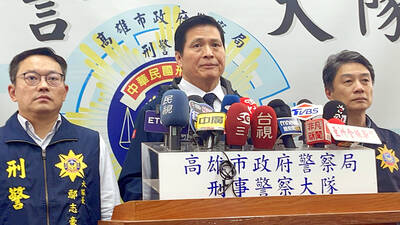Starting today, people arriving in Taiwan from abroad would be allowed to visit hospitals while practicing seven days of “self-disease prevention” if they fulfill certain criteria, the Central Epidemic Command Center (CECC) said yesterday.
Taiwan is today to lift mandatory quarantine for international arrivals as it switches to the “0+7” policy, which means observing seven days of “self-disease prevention” after arrival, said Centers for Disease Control (CDC) Deputy Director-General Chuang Jen-hsiang (莊人祥), who is the CECC’s spokesperson.
The restrictions on entering healthcare facilities are being eased for arriving passengers, as some might be traveling to Taiwan to seek treatment or visit patients in hospital, said CDC Deputy Director-General Philip Lo (羅一鈞), deputy head of the CECC’s medical response division.

Photo courtesy of E-Da Hospital via CNA
People should not visit hospitals when they are practicing “self-disease prevention,” but there are some exceptional conditions, he said.
People may visit a patient who is undergoing surgery, an invasive exam or treatment and needs to be accompanied by a family member; if the patient is in an emergency room, intensive care unit or hospice ward and a family member needs to learn about their condition; and if the patient’s condition worsens or becomes critical; as well as other special reasons stipulated by hospitals, Lo said.
People may accompany a patient in a hospital if the patient needs special care, such as children who cannot take care of themselves, Lo said.
People who want to visit or accompany a patient must gain approval from the hospital and test negative for COVID-19 with a rapid test on the day of their visit or daily for the duration of their stay at the hospital, he said.
People undergoing “self-disease prevention” should delay non-urgent or unnecessary exams or treatment, but doctors can assess infection risks and determine if a patient needs urgent or necessary treatment, he added.
Healthcare workers undergoing “self-disease prevention” must test negative with an at-home rapid test before returning to work and take a rapid test every one or two days during the seven-day period, Lo said.
Hospitals can determine the frequency of the tests based on the personnel’s infection risk and nature of work, he said.
Travelers arriving in Taiwan must take a rapid test on the day of arrival (Day 0) and stay in a separate room with an en-suite bathroom during the “self-disease prevention” period, Chuang said.
People undergoing “self-disease prevention” should avoid meeting with people who are at high risk of severe illness, including elderly people, young children and immunocompromised people; avoid visiting healthcare facilities and long-term care facilities; and rest at home and get tested for COVID-19 if they develop symptoms, he said.
They need to test negative with a rapid test within the previous two days of going outside, he added.
They need to practice social distancing and wear a mask when leaving their residence. They can take their mask off only when eating or drinking, and they must not sit with people they do not know at restaurants.
If people test positive for COVID-19 during the seven-day period, they should seek medical attention through telemedicine for diagnosis, Chuang said.
Mild cases can stay at a private residence, enhanced quarantine hotel or a centralized quarantine facility for isolation, he said.
If they need in-person medical attention, they should contact the local health department to arrange transportation to a hospital or ride in a private vehicle driven by another person, with both of them wearing masks, he added.
Chuang said inbound travelers who arrived in Taiwan yesterday or before are still subject to the “3+4” quarantine rule — three days of quarantine followed by four days of “self-disease prevention” — and are required to comply with the corresponding restrictions.

Twenty-four Republican members of the US House of Representatives yesterday introduced a concurrent resolution calling on the US government to abolish the “one China” policy and restore formal diplomatic relations with Taiwan. Led by US representatives Tom Tiffany and Scott Perry, the resolution calls for not only re-establishing formal relations, but also urges the US Trade Representative to negotiate a free-trade agreement (FTA) with Taiwan and for US officials to advocate for Taiwan’s full membership in the UN and other international organizations. In a news release announcing the resolution, Tiffany, who represents a Wisconsin district, called the “one China” policy “outdated, counterproductive

Actress Barbie Hsu (徐熙媛) has “returned home” to Taiwan, and there are no plans to hold a funeral for the TV star who died in Japan from influenza- induced pneumonia, her family said in a statement Wednesday night. The statement was released after local media outlets reported that Barbie Hsu’s ashes were brought back Taiwan on board a private jet, which arrived at Taipei Songshan Airport around 3 p.m. on Wednesday. To the reporters waiting at the airport, the statement issued by the family read “[we] appreciate friends working in the media for waiting in the cold weather.” “She has safely returned home.

ON PAROLE: The 73-year-old suspect has a criminal record of rape committed when he was serving in the military, as well as robbery and theft, police said The Kaohsiung District Court yesterday approved the detention of a 73-year-old man for allegedly murdering three women. The suspect, surnamed Chang (張), was arrested on Wednesday evening in connection with the death of a 71-year-old woman surnamed Chao (趙). The Kaohsiung City Police Department yesterday also unveiled the identities of two other possible victims in the serial killing case, a 75-year-old woman surnamed Huang (黃), the suspect’s sister-in-law, and a 75-year-old woman surnamed Chang (張), who is not related to the suspect. The case came to light when Chao disappeared after taking the suspect back to his residence on Sunday. Police, upon reviewing CCTV

TRUMP ERA: The change has sparked speculation on whether it was related to the new US president’s plan to dismiss more than 1,000 Joe Biden-era appointees The US government has declined to comment on a post that indicated the departure of Laura Rosenberger as chair of the American Institute in Taiwan (AIT). Neither the US Department of State nor the AIT has responded to the Central News Agency’s questions on the matter, after Rosenberger was listed as a former chair on the AIT’s official Web site, with her tenure marked as 2023 to this year. US officials have said previously that they usually do not comment on personnel changes within the government. Rosenberger was appointed head of the AIT in 2023, during the administration of former US president Joe